Introduction
Another 4th of July is now upon us, and with it, as has been my custom, I am republishing an article I wrote a decade ago entitled, “Why We Celebrate—The Real Meaning of the Fourth of July.” Before getting to the article, however, I want to share a few observations regarding claims recently made in several publications that the United States is intrinsically racist and has been from its inception; even going so far as to claim that the purpose of the American Revolution was the preservation of slavery. The effort in this appears to be to attempt a reframing of our nation’s historical narrative away from our traditional stories and myths and more toward the idea that racism and slavery are central to all our country has been and still is today.
Personally, I believe our country would benefit greatly from a truer and more honest historical narrative. To be sure, when one realizes that 41 of the 56 signers of the Declaration of Independence owned slaves, and that a devastating Civil War was fought to resolve the issue, it doesn’t take a genius to realize that slavery and racism played significant roles through much of our past, even extending up to present time. Slavery, racism, Jim Crow, the Klan, lynchings, segregation and more are undeniable aspects of our nation’s history. Equally undeniable to me, however, is the truth that those who founded our nation did so on the principles of natural rights and liberty, and when they did they set in motion an inevitable sequence of events that has resulted in the end of slavery, segregation and Jim Crow and vast improvement in civil rights for all citizens. One historian I encountered phrased the Revolution’s impact this way: “The American Revolution secured our independence, established our republic, created our national identity and committed our nation to ideals of liberty, equality, natural and civil rights…It articulated ideals fundamentally at odds with slavery, and set that abhorrent practice on the path to extinction. Principled opposition to slavery was barely expressed prior to the American Revolution. The Revolution threw slavery on the defensive. Its commitment to universal natural rights inspired the growth of abolitionism across the Atlantic world.”
I agree. Did it take too long for the principles of equality and liberty espoused in the Declaration to vanquish slavery and Jim Crow? Of course. Have we completely vanished racism from our nation? No. The United States is still a work in progress on those and many other counts.
But, I believe enough evidence has now been gathered from our country’s nearly 250 years, that were we to recast our national historical narrative it ought to be phrased in terms of our nation’s internal struggle to live up to the magnificent principles of its founding and to make them manifest for ALL people. Far from being nothing but an exercise in the evils of slavery and racism, I believe that would be a truer statement of the story of the United States of America.
It’s with that in mind that I’m once again publishing this article, the true story of The Declaration of Independence and our nation’s founding: “Why We Celebrate—The Real Meaning of the Fourth of July.”
Wishing you the best Fourth ever!!
Mark Arnold
July 3, 2024
_________________________________
 That Americans love to celebrate is rarely more evident than the Fourth of July. Fireworks, picnics, beer and baseball have sway, with often just a bit too much stress on the beer. For most of us born in this country, all of our lives it has been this way. As kids it was a time for firecrackers and sparklers and as teens a time to party. For the few weeks prior to the traditional early summer celebration people greet neighbors and friends with, “What are you doing for the Fourth?”, it being understood that they mean the Fourth of July. And on the Fourth of July itself, it seems the whole country just shuts down. The streets and roads take on an eerily silent aspect until dusk, when neighborhood after neighborhood explodes in fireworks glory.
That Americans love to celebrate is rarely more evident than the Fourth of July. Fireworks, picnics, beer and baseball have sway, with often just a bit too much stress on the beer. For most of us born in this country, all of our lives it has been this way. As kids it was a time for firecrackers and sparklers and as teens a time to party. For the few weeks prior to the traditional early summer celebration people greet neighbors and friends with, “What are you doing for the Fourth?”, it being understood that they mean the Fourth of July. And on the Fourth of July itself, it seems the whole country just shuts down. The streets and roads take on an eerily silent aspect until dusk, when neighborhood after neighborhood explodes in fireworks glory.
Yes…Americans do love the Fourth of July!
As I have gotten older, however, I have found myself increasingly wondering if most Americans really know what they are celebrating on Independence Day? Considering what has happened to our nation just since the end of World War II, a period of seventy years, it is easy to see why one would wonder. Just recently we have become aware of spying done by the National Security Agency for many years on the e-mails and private communications of average American citizens. During this time we have witnessed our Constitution and Bill of Rights become eroded to the point that the 2nd Amendment is considered by many Senators and Congressman to be outdated; and the President can now take us to war without a declaration from Congress (which is required by the Constitution), as has happened in Korea, Vietnam, both Iraq wars and Afghanistan. Recently I was listening to a radio commentator and he reported that most American teens score worse on the citizenship test that immigrants must take to become an American citizen than the immigrants do. A young friend, who had completed high school not too long ago, recently asked me if I knew who we were fighting in the War of 1812 and why? He really did not know that it was the British we fought in that war–the same British that we had defeated only 30 years earlier to gain our independence. Understanding this, the question is a reasonable one: do we Americans, as we brandish our sparklers and eat our Fourth of July BBQ, really get what this holiday is all about?
So, feeling like I do, I thought I would take a few moments to explain—what about the Fourth of July? What is it that makes this day more than just a day to party?
It is commonly understood that on the Fourth of July we celebrate Independence Day; that day in 1776 when the original 13 colonies at last broke from England determined to form a new nation. What may not be known is that this was far from an instantly unanimous and easily arrived at decision. There is a great deal to know about the founding of our nation and, with another Fourth of July now upon us, we could all stand a little refresher. With your permission, then, let us all hop in the “Way-Back Machine” and take a trip backward through time.
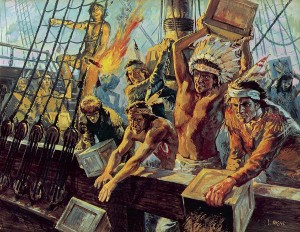
We have arrived in Philadelphia in September of 1774. The First Continental Congress, with representatives from 12 of the 13 colonies, is meeting in response to the “Coercive Acts” (called the “Intolerable Acts” by the colonists), which are laws passed by the British Parliament in response to the “Boston Tea Party”. Now you have all heard of the Boston Tea Party, but perhaps have forgotten the specifics. One night in November of 1773 anywhere from 60 to, by some accounts, 200 rabble rousers, most of them members of a radical group that wanted independence from England called “The Sons of Liberty”, dressed themselves as Native Americans, boarded 4 British ships and dumped their cargo of tea, over £10,000 worth ($1.5 million today), into the Boston harbor. Their reasons for doing this stemmed from their protest of a chain of events that had started with the nearly bankrupt British East India Co. raising the price of tea from 2 shillings to 3 shillings a pound. As a result a thriving market was created for Dutch tea which still sold at 2 shillings. To halt this price competition and support the East India Co. the English Parliament then granted East India Co a monopoly on American tea distribution, thus wiping out the colonial merchant middle men and enforcing the higher East India price. All of this was done without the Colonies having any representation in Parliament and therefore no say in the matter.
So, in May of 1774 Parliament passed the “Intolerable Acts”. These laws literally shut down the Boston port until full restitution was made for the tea tossed into the drink by the radicals, thus punishing the bulk of Boston citizens instead of those who actually destroyed the tea. The laws also dictated that the colony’s executive council would no longer be democratically elected but instead would be appointed by the King; and, as well, limited town meetings to one per year. Other laws restricted justice procedures in the colony. These laws, from the colonial view, were the latest in a series of arbitrary actions by the King and Parliament that imposed taxes and conditions on them in which they had no say.
In passing the “Intolerable Acts” the British hoped to detach and isolate the Massachusetts radical element from the rest of the colonies. Instead the reverse effect was created, as the other colonies, observing the Massachusetts example, reasoned the same could happen to them; and to some degree they started rallying to the aid of Massachusetts. This is what led to the convening of the First Continental Congress in Philadelphia in September 1774; at the same time sowing the seeds of what would become the United States of America.
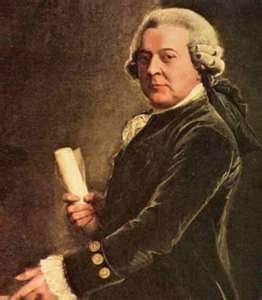
The Massachusetts delegation to the First Continental Congress is led by a unique pair: a Boston attorney named John Adams and his well educated but radical, brewer cousin Samuel Adams. Samuel is a leader in the “Sons of Liberty” and one of the instigators of the Boston Tea Party. At this first Congress the Adams cousins are lobbying hard for a strenuous response to the hated British laws, but in the end many delegates are opposed to conflict with England. The result, after weeks of deliberation, is a decision to boycott British trade and a petition to the King for a redress of grievances. Both Adams cousins are frustrated with what they consider a weak response from the colonies. They know that no one will adhere to the boycott and that King George III will ignore their petition. From Samuel Adams’s view it is a spineless action agreed to by those who are placing their personal interests above the greater cause of liberty. It is the the kind of thing that would prompt him a year hence to state:
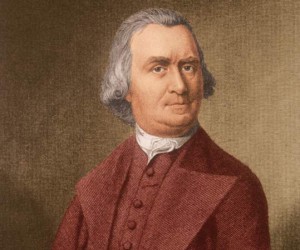
“If ye love wealth greater than liberty, the tranquility of servitude greater than the animating contest for freedom, go home from us in peace. We seek not your counsel, nor your arms. Crouch down and lick the hand that feeds you. May your chains set lightly upon you; and may posterity forget that ye were our countrymen.” [1]
We move forward, now, to the spring of 1775. Word has arrived that the King and Parliament have rejected the petition of the prior fall. The pace is quickening toward revolution with violence erupting at the battles of Lexington and Concord, two small towns just a few miles outside of Boston in Massachusetts. The British General Thomas Gage is ordering his troops to confiscate colonial arms and ammunition suspected to be stored in the two towns and also, if possible, to capture and hang Sam Adams and John Hancock. (Hancock was one of the Boston Merchants heavily affected by British efforts at restricting trade and imposing taxes and was, along with Sam Adams, an early advocate of independence.) Alerted by the famous “midnight ride” of Paul Revere, the farmers and shopkeepers first meet the British troops at the Lexington village green on the morning of April 19th, 1775. Howard Fast in his book “Citizen Tom Paine” describes what happens next:
“The British troops marched to within a dozen yards of the villagers before their commanding officer, Major Pitcairn, ordered them to halt. For long moments the two groups faced one another; it was a moment the redcoats were trained for, but the farmers’ hands were wet on their guns. Then Major Pitcairn spurred to the front of his troops and roared, ‘Disperse!’
“The farmers growled.
” ‘God damn you bloody rebels, lay down your guns!’
“It was there, hot and terrible; they were rebels. This idea that they had conceived, that they should be free men with the right to live their lives in their own way, this tenuous, dream-like idea of liberty that men of goodwill had played with for thousands of years had suddenly come to its brutish head on a village green in Lexington. The farmers growled and didn’t lay down their guns; instead one of them fired, and in the moment of stillness after the roar of the big musket had echoed and re-echoed, a redcoat clutched at his tunic, and then rolled over on the ground.”
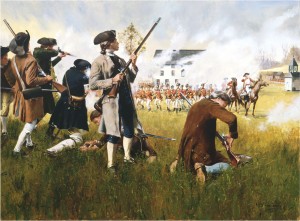
That unknown farmer or shopkeeper on the village green that morning fired the “shot heard around the world”. With that shot commences the first battle of the American Revolution. Before the day ends 73 British soldiers are killed and 170 wounded with colonial casualties of 49 dead and 39 wounded.
Once more we hop forward in time. It is now several weeks later; May 1775, and the 2nd Continental Congress is convening, again in Philadelphia and, again, debate is raging over splitting from England or trying to reconcile. In the middle of this debate the delegates are getting word of the battles of Bunker and Breeds Hill outside of Boston at which 400 colonial militia are killed while inflicting over 1,000 casualties on the British. This time John Adams and the Massachusetts contingent are making a much stronger case, but still many in Congress, including the admired and respected John Dickinson of Pennsylvania, are arguing for a peaceful solution.
The debate between Dickinson and John Adams is becoming heated. At one point Dickinson warns:
“You New England men will have blood on your heads should you continue to refuse to consider peaceful options.”
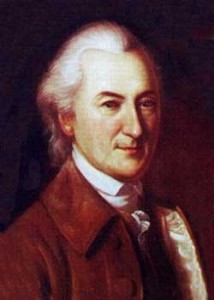
Which prompts a vehement response from Adams:
“Powder and artillery are the most efficacious, sure and infallible conciliatory measures we can adopt!”
To which Dickinson retorts:
“What is the reason, Mr. Adams, that you New England men oppose our measures of reconciliation? Look, ye! If you don’t concur with us in our pacific system, I, and a number of us, will break off from you in New England and we will carry on the opposition by ourselves in our own way.”
Again, and despite the blood being shed in Massachusetts, the deliberations are bogging down. Though George Washington is appointed as Commander in Chief of what is now being called the Continental Army, the strongest measure the delegates are authorizing is something called “The Olive Branch Petition”. Drafted by Dickinson and a young Virginian named Thomas Jefferson and passed despite the protests of the Adams cousins, the petition is a last resort appeal to King George III and Parliament to reconcile differences and avoid war. This meeting of the Continental Congress is not willing to confront or make the final break from England. Independence is going to have to wait.
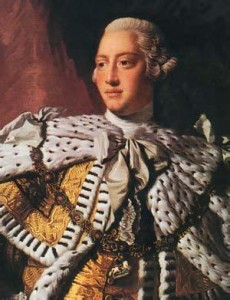
Our “Way Back” machine is now moving us a few months forward in time. It is early 1776 and the situation in the colonies is being inflamed by the publication of the pamphlet “Common Sense” by a transplanted Englishman named Thomas Paine. The pamphlet quickly sells over 100,000 copies, an astounding number considering the publication and distribution limitations of these times. “Common Sense” makes the case to the common man for splitting from England and, as well, attacks the British monarchy as a tyranny. In Paine’s own words from Common Sense:
“Oh ye that love mankind! Ye that dare oppose, not only tyranny, but the tyrant, stand forth! Every spot of the old world is overrun with oppression. Freedom hath been haunted around the globe. Asia, and Africa, had long expelled her. Europe regards her like a stranger, and England hath given her warning to depart. O! Receive the fugitive, and prepare in time an asylum for mankind.”
While “Common Sense” is spreading through the colonies like a wildfire, the 2nd Continental Congress reconvenes in Philadelphia in February, 1776. Word has come that King George III has spurned the Olive Branch Petition and is stating that anyone persisting to support the notion of independence will be considered a traitor and upon capture will be hung. On hearing this Pennsylvania delegate and Philadelphia’s own Benjamin Franklin quips:
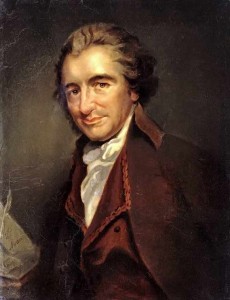
“Gentleman, we must all hang together or we shall most assuredly hang separately.”
With the effect of “Common Sense” popularizing the cause, along with the King’s petition rejection, public opinion is starting to swing in favor of independence. John Adams, Sam Adams and others realize now is the time to press for the split from England. They understand that to win independence from England the Colonies will need help, probably from France, and that unless they are willing to assert their independence they have no real right to expect any other power to assist them.
The “Way Back” again brings us forward in time and lands us in early June, 1776. A group of delegates led by those from Massachusetts (John and Sam Adams) and Virginia (Richard Henry Lee and Thomas Jefferson), are pushing hard for the break from England. Other delegates, such as Benjamin Franklin, are supporting them. The independence faction is still opposed by Franklin’s fellow Pennsylvanian John Dickinson and his allies. A resolution is proposed by the Virginian Richard Henry Lee:
“Resolved…That these United Colonies are, and of a right ought to be, free and independent states, that they are absolved of all allegiance to the British Crown, and that all political connection between them and the state of Great Britain is, and ought to be, totally dissolved.”
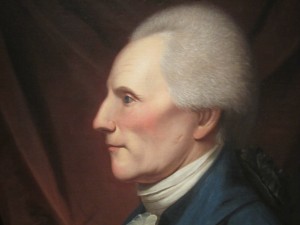
And so begins the debate. Though momentum for independence is mounting, Dickinson and others are still making spirited arguments for reconciliation. It is becoming as hot inside the Congressional chamber as the June days are outside. Even now, just weeks before that famous first ever 4th of July, independence is a conclusion far from forgone.
On June 10th a recess is called for 20 days so that delegations can consult with their home colonies for instructions. It is during this 20 day period that, at the request of John Adams, Thomas Jefferson writes the Declaration of Independence. It is the intention of Adams, Franklin and Jefferson that when Congress reconvenes in early July, the Declaration be ready for review and debate.
The “Way Back” now jumps us forward a couple more weeks to July 1st, 1776. It is hot in Philadelphia. Realizing the moment is at hand John Adams prepares to engage in the debate of his life. Indicating that he fully grasps the importance of the occasion, a few days earlier he writes to a friend:
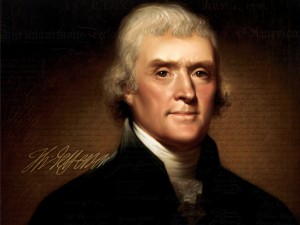
“Objects of the most stupendous magnitude, measures in which the lives and liberties of millions, born and unborn are most essentially interested, are now before us. We are in the midst of revolution, the most complete, unexpected, and remarkable of any in the history of the world.”
Under no delusions as to the cost to be paid for the freedom he is fighting for, that very morning of July 1st, 1776 Adams writes the following to his friend and former delegate from Georgia, Archibald Bulloch:
“This morning is assigned the greatest debate of all. A declaration, that these colonies are free and independent states, has been reported by a committee some weeks ago for that purpose, and this day or tomorrow is to determine its fate…The object is great which we have in view, and we must expect a great expense of blood to obtain it. But we should always remember that a free constitution of civil government cannot be purchased at too dear a rate, as there is nothing this side of Jerusalem of equal importance to mankind.”
Opposing Adams on this day is, of course, Pennsylvania’s John Dickinson. Now, you would think that Adams and Dickinson, after nearly two years of wrangling over the issue, would have said all that could be said on the subject of independence. But no…Dickinson is determined to make one last stand on the matter, and Adams is equally determined to rebut. Like the great attorneys they are, they martial all of their powers of persuasion and reason in one last, all out effort to swing the delegates to their cause.
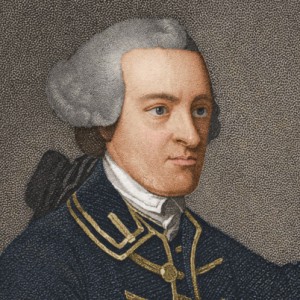
The gavel falls and the President of the 2nd Continental Congress, John Hancock, calls the day’s proceedings to order. Dickinson is the first to speak. Aware that the tide of opinion is turning towards independence and revolution, he states his case:
“My conduct this day, I expect, will give the finishing blow to my once great…and now too diminished popularity…but thinking as I do on the subject of debate, silence would be guilt.”
And he then goes on to make his argument against the measure of independence and sums up as follows:
“No Gentlemen…to escape the protection of Great Britain by declaring independence, unprepared as we are, would be to brave a storm in a skiff made of paper.”
Impressed by the passion of Dickinson’s words, it is a solemn group of delegates facing John Adams as he takes the floor following the distinguished Pennsylvanian. Presently Adams starts to speak, and once he starts he continues for over an hour. No transcription is made, nor are any notes kept of Adams’s speech on this day. Writing later about the moment, however, Thomas Jefferson stated that John Adams was:
“… not graceful nor elegant, nor remarkably fluent, but he spoke with a power of thought and expression that moved us from our seats.”
Richard Stockton, a delegate from New Jersey, stated that Adams was “the Atlas” of the hour. He was, according to Stockton:
“…the man to whom the country is most indebted…He it was who sustained the debate, and by the force of his reasoning demonstrated not only the justice, but the expediency of the measure.”
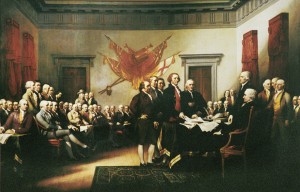
John Adams speech this day is the most important of any in his life and, it can be argued, of any in the history of the United States. In the vote that follows, on July 2nd, 1776, the 2nd Continental Congress passes the resolution to dissolve political connections with England by a count of 12 for to 0 against with one colony (New York) abstaining. The split from England is now a fact. The Declaration of Independence, revised somewhat from Jefferson’s original words, is approved on July 4th, 1776 with the exact same vote of 12 to 0. (New York, again, abstaining). Forever more its famous words will serve as inspiration to freedom loving people everywhere:
“We hold these truths to be self-evident, that all men are created equal, that they are endowed by their Creator with certain unalienable rights, that among these are life, liberty, and the pursuit of happiness. That to secure these rights, governments are instituted among men, deriving their just powers from the consent of the governed.” [2]
The Declaration goes on to enumerate the reasons that impelled the delegates and their colonies to this action of independence and then concludes with:
“And for the support of this Declaration, with a firm reliance on the protection of divine Providence, we mutually pledge to each other our lives, our fortunes, and our sacred honor.” [3]
It is now done. Those signing the Declaration and those in the colonies supporting them are willing to risk everything for Liberty!
Our tour of the events leading to our nations founding now complete, the “Way Back” machine is depositing us back in the present. It has been a fascinating trip. In looking back at that era, it is clear that John Adams was one of those rare individuals who had a full appreciation of the historical importance of what he and the other founders were accomplishing, even as they were doing it. With regard to what he and the Continental Congress had done in voting for independence from England and the importance of it to future generations he had this to say:
“The second day of July will be the most memorable epocha [4] in the history of America. I am apt to believe that it will be celebrated by succeeding generations as the great anniversary festival. It ought to be commemorated as the day of deliverance by solemn acts of devotion to God Almighty. It ought to be solemnized with pomp and parade, with shows, games, sports, guns, bells, bonfires, and illuminations from one end of this continent to the other from this time forward forever more.”
I think we can excuse John Adams for being two days off in his prediction as to the day of celebration, don’t you? His forecast of “shows, games, sports, guns, bells, bonfires, and illuminations” was and is uncannily accurate.
And so we celebrate the Fourth of July. But as we do, we as Americans should keep in mind that we have a great deal to learn from the men and women who founded this nation. Benjamin Franklin once said:
“They who can give up essential liberty to obtain a little temporary safety deserve neither liberty or safety.” [5]
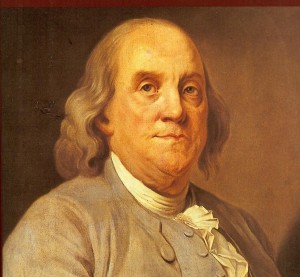
This is something our Founding Fathers were well aware of. They may have been flawed as individuals, but that they were willing to and did pay the price of freedom is something no one can today question. When they voted for independence and signed that Declaration they took their lives in their hands. I wonder sometimes, in looking at what they did, would we have the courage to do the same?
It is, in many ways, because of their foresight and willingness to put it all on the line for freedom that we now exist here today with the same opportunity. This is a legacy too precious to waste. We face challenges in our day every bit as dangerous to liberty, if more covert, than those faced by Jefferson, Franklin, Adams and the others in their day. Let it not be said of us that we were not equal to the task. Do all you can to understand what is at stake and to protect our rights and freedoms as guaranteed by our nation’s founding documents.
And one day, if Liberty wins, future generations will look back at us, as we look to that founding band of brothers, with reverence and respect for what we did to ensure that night’s curtain did not fall on freedom.
Dedicated to those whose constant vigilance, willingness to fight back and sacrifice have always and always will pay the Price of Freedom!
Note: All quotations except as footnoted or noted in the text are from David McCulloch’s book “John Adams”.
Except for quoted material, Copyright © 2009, 2012 by Mark Arnold,
All Rights Reserved
[1] Samuel Adams: from a speech at the Philadelphia Statehouse, Aug 1st 1776
[2] Thomas Jefferson: from the Declaration of Independence
[3] Thomas Jefferson: from the Declaration of Independence
[4] From the Geek “epoche” meaning “a fixed point in time”
[5] From the motto on the title page of “An Historical Review of the Constitution and Government of Pennsylvania”, published in 1759 by Benjamin Franklin

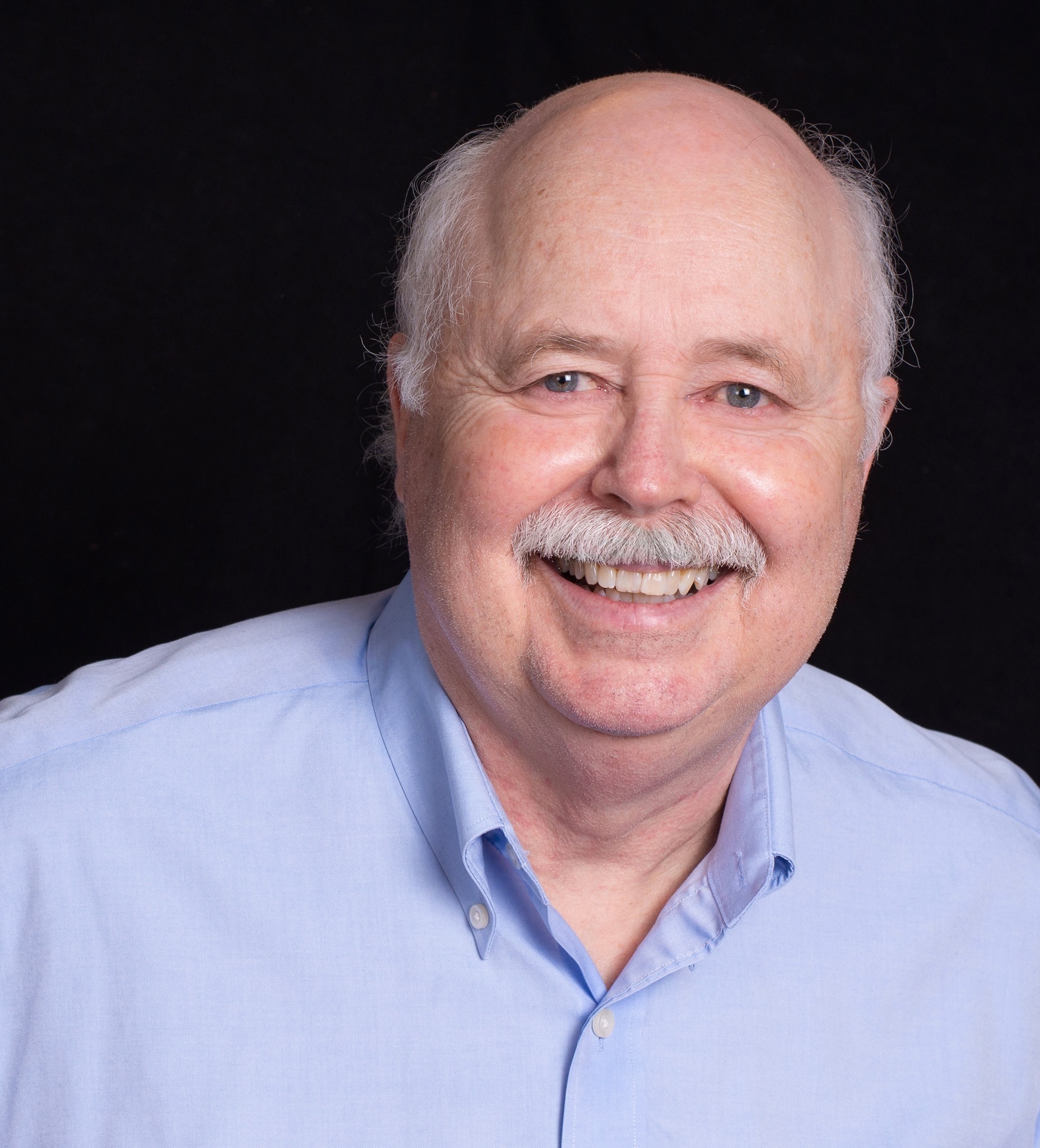
41 Responses
Well done, Mark.
Thanks John! What an amazing thing out ancestors did. Gives us something to live up to.
Great summary Mark. You always convey the emotion of the subject so well. I love reading your writings. Freedom is intrinsically man’s greatest passion as it is only Freedom that alows us to project ourselves into the world and other peoples lives. Unfortunately, as I also personally experience, comfort is the great deceiver. We forget as the Founding Fathers demonstrated “Freedom isn’t Free”, and takes daily vigilance to protect it and preserve it. The temptation to give up freedom for security seems to penetrate the protective walls of freedom better than any other weapon thrown at as from any hostile enemy. Let us all have the courage to confront our fears of loss and stand for the only thing that preserves us as beings. FREEDOM!!!!!!!! Love you brother. Happy Independence Day. Jonathan
Jonathon, thank you, brother, for the beautiful acknowledgement, as well as for the points you make about “security” being the great deceiver. What you state is so very true and it is my hope that we can raise our nation back up to one the Founders would be proud of.Keep living the truth and Happy Independence Day to you!! L, Brother Mark
Mark, that is a hell of a nice piece of writing! Thanks.
Thanks Robert!
Well done Mark. Freedom is it’s own motivator, generator, and perpetuators. We will rise to the challenge for we are they.
Thanks John! Good to hear from you and excellent comment as well as observation.
I am so pleased to have found this site! (I am forwarding this to Bill – I’m sure he’ll be in touch as well.)
What has always struck me as astonishing is that these beings all arrived in the same place, at the same time, to bring our nation into existence. Each of them gifted, intelligent and supremely confident of their right/ duty to do what they did. No small feat.
Hi Janet! Thanks, and I have always been struck by that same observation as well. Makes you wonder if it was just a fortuitous combination of circumstance or if there was/is some design behind it all. Tell Bill I look forward to hearing from him. L, Mark
Hi there Mark. Well done on a nice, well written article. I really wish that the current generation would be properly educated in the matters of the Bill of Rights and the Constitution. In my school days back in the 60’s the teachers would pound those two items into my head. To this day I preach these to the current generation. More often than not they give me a blank stare. What a shame. Despite this I know that we are the true beacon of freedom for one and all.
Thanks Robert! I have observed much the same as you describe and it is a major reason I write articles such as this. Keep up the great work in all you do, and I will too! Your pal, Mark
Hi Mark. Thank you for the refresher on that courageous, fabulous and epoch decision that those great leaders-of-men reached. I can imagine what it must have been like, a feeling of uncharted territory. Stan
Hi Stan! You are very welcome, and I agree completely. It was uncharted territory for the times. Everything to that point had pretty much been monarchies with divine right of Kings and all that stuff. What these guys did was a real game changer. L, Mark
Nice work mark! This tells the great tale of the great men who brought us through those trying times and laid a sensible, rational foundation for a sane society. Now all we have to do is clear the current citizenry so they can actually receive and live by these example and principles- the truly missing ingredient and why you have to write these articles since most are too bound beneath the burden of collective thought agreement to be free enough to implement and live by these principles! Keep up the good work on both fronts!!
Thanks Joe! It’s a labor of love. MA
Mark
One additional year and all its profound moments have passed since your insitefull and inspiring commentary on our founding fathers decision to break their chains of bondage from mother England.
What a year it has been from the tragedies of seemingly random public mass shootings, an almost invisible yet pervasive jolt of fear and terror called ISIS, a political system that leaves us wondering whether a time will come again when we the left, right, or center will be represented with one man one vote not distracted by debates of Tom foolery, super funds and superdelegates.
Yet we were all reminded by the passing of a champion friend that we can all be aware we are born as Clay and fight changed as an Ali. Changed by what we know without being told, ask permission, or approval for; what is right, just, and ours as a people. What inspires us to take from God’s laws and write on parchment as mans laws, that we hold these truths to be self evident. A change that speaking for myself comes from daily if not continuous diligence to resist the temptation of comfort and its padded chains. To look squarely and deeply into my soul, that I have been blessed with a spirit of man, that transcends the physical universe which seems to attempt to cover it with a veil of justifications for its lack of importance compared to the comforts of the flesh.
For I am an American, son of Imigrants, founded in struggle, and blessed to be free due to the sacrifice of many great men and women before me. It is for that on this day I give thanks and celebrate by filling the skys with portraits of color….. FREEDOM!!!! Happy 4th
Thanks for the beautiful commentary, Jonathon! Wishing you and Caroline an awesome 4th! L, Mark
Thanks again Mark for sending this article to me, every year I read it in a new unit of time and it rekindles my patriotism .
You know this occurred 240 years ago…not so long ago really when you look at the scheme of things, just 3 lifetimes!
L, Melissa
Hi Melissa! The story of our nation’s founding is such an inspiring one that I don’t know how it could do anything but re-kindle our patriotism. Your observation of how recently it happened is also very astute. The legacy the Founders passed on to us is now ours to pass on. We need to be equal to the task, which is why i publish this reminder every year. Love, Mark
Yes, it is good that you do as we must uphold and lay steady this legacy.
L, Melissa
Hello Mark, I have not read this in a couple of years and I am glad I saw it just now. I have appreciated this from the first time that I read it. It is a reminder of those before us that realized that true freedom is not free. Never has been, never will be. The majority of people today just disregard it as a given and it is a crime. I look at the condition of the US now and it is disheartening. If it were not for writings such yours it may well be forgotten how important the fight for freedom truly was and still is. So, thank you for this. Your writings are always very well done and are inspiring. You have a geuine talent for bringing the facts together and presenting them in a way that make them interesting and very relevant. Thank you friend!
Thanks for the acknowledgement Val! The story of this most unique of American holidays must never be forgotten and I will continue to do all I can to ensure it is not. And the same for the men and women who paid the “Price of Freedom”. Thanks for all you do. L MA
I applaud your passion. Very nice, Much Thanks, Mark.
Thanks Jim! Have a great 4th! L M
I have timely come upon your factual presentation of “what the hell” we are really engaging in daily–“life” for real and true or the easier ways and venues to fill the gaps of space and time that don’t most times have a bit to contribute to all our freedoms! I depend on your guidance in many ways, but they all combine to still be a personal decision to do what contributes to everyone’s freedom, or it does not. Not a difficult choice without self-imposed blinders! Thanks immensely. And to Melissa, I also see the “history” as really recent and, as well, perfectly pertinent. Jo Lear
Thanks for taking the time to read and comment Joline. We have much to do, as you know, and I am glad to be able to work with you. Onward…MA
Well written Mark!!!
I really enjoyed the trip back in time to the scene of the actual birth of our Great Nation, which is super relevant for every American Citizen to read and learn about today, as our Nation is not so great any longer, but our Citizens are Great or can be Great anytime they decide to be.
I join you in acknowledging those of us in the Ranks of Freedom Fighters who are always able, willing and ready to Fight Back, and expose lies of the Freedom suppressors with the Truth of the Freedom Fighters!
Long Live the Good Fight for All of Our Freedoms in this “Land of the Free and Home of the Brave!”
Thanks for the acknowledgement Tari. And thanks as well for the inspiring words. MA
Life in it’s hunger ,eats it’s own
With a smirk and a smile
It strips the bone
Close your eyes and be the meat
Or take a look and
We’ll drink while we eat
Thanks for offering the many a “Good Look” at the day and it’s import.
Thanks for the exquisite response, Roger. As always, you elevate the mundane to the sublime…MA
Thank you Mark Arnold!
You’re welcome, Scott! have a great 4th!
A well written piece of patriotism by a true patriot who he himself fights for freedom every day.
Thank you.
Thanks so much for the beautiful acknowledgement, Sean! And you’re welcome..L Mark
Flintlock,
I wholeheartedly agree that the central theme of American history has been the ongoing struggle to actually live up to and embody the noble sentiments articulated by the Founders. You know this from reading my memoir/autobiography. It is still an unfinished task. And it’s important to listen to voices we might not normally hear in addressing this subject. That’s why I read “The 1619 Project” and am currently reading Pulitzer Prize-winning author Isabel Wilkinson’s incredible book, “Caste: The Origins of Our Discontents.” I highly recommend both, especially the latter. The hallmark of education is to challenge so we can grow. Otherwise, we remain ignorant within our accustomed bubbles.
The Second Amendment is probably the most vexing item in our founding documents. I see people misapplying it all the time, claiming they have “a Second Amendment right” to buy, own and use semi-automatic assault weapons. There is, of course, no reference to such weapons in the Second Amendment because they didn’t exist in the 18th century. The Second Amendment, as originally written and intended, had to do with the right of citizens in each state to bear arms in a militia. That is all it says. It was also a compromise with Southern states because in the slave states militias were often used to police slave revolts. But the Founders feared standing armies, and the Second Amendment spoke to that concern.
It wasn’t until 2008, in the Supreme Court’s Heller decision, that the right to own and bear arms for personal self-defense was actually articulated into law, and even then there were limits. Antonin Scalia, in writing his opinion about the case, stated that there were weapons not covered by the Heller decision. These were all in the category of military weapons, such as machine guns, mortars, howitzers, artillery, etc. AK-47s fall into that category, too. But to the gun lobby and its adherents the “right” to buy and own such weapons is sacrosanct, even as they are used to mow down children in schools. This is simply insanity from any objective viewpoint, and a manifestation of some pretty deep-seated computations–to say nothing of a complete misreading of the Second Amendment.
Former Supreme Court Justice John Paul Stevens has this to say about the Amendment in his book “Six Amendments: How and Why We Should Change the Constitution”:
“For over two hundred years following the adoption of that Amendment federal judges uniformly understood that the right protected by that text was limited in two ways: first, it applied only to keeping and bearing arms for military purposes, and second, while it limited the power of the federal government, it did not impose any limit whatsoever on the power of states or local governments to regulate the ownership or use of firearms. Thus, in United States vs. Miller, decided in 1939, the Court unanimously held that Congress could prohibit the possession of a sawed-off shotgun because that sort of weapon had no reasonable relation to the preservation or efficiency of ‘a well-regulated militia.’
“When I joined the Court in 1975, that holding was generally understood as limiting the scope of the Second Amendment to uses of arms that were related to military activities. During the years when Warren Burger was Chief Justice, from 1969 to 1986, no judge or justice expressed any doubt about the limited coverage of the Amendment, and I cannot recall any judge suggesting that the Amendment might place any limit on state authority
to do anything. Organizations like the National Rifle Association disagreed with that position and mounted a vigorous campaign claiming that federal regulation of the use of firearms severely curtailed Americans’ Second Amendment rights. Five years after his retirement, during a 1991 appearance on the MacNeil/Lehrer News Hour, Burger himself remarked that the Second Amendment ‘has been the subject of one of the greatest pieces of fraud, I repeat the word ‘fraud,’ on the American public by special interest groups that I have ever seen in my lifetime.'”
Stevens goes on in more detail about subsequent rulings and his dissents, which you can read in his book. I’ll just add the following excerpt:
“As a result of the rulings in Heller and McDonald, the Second Amendment, which was adopted to protect the states from federal interference with their power to ensure that their militias were ‘well-regulated,’ has given federal judges the ultimate power to determine the validity of state regulations of both civilian and militia-related uses of arms. That anomalous result can be avoided by adding five words to the text of the Second Amendment to make it unambiguously conform to the original intent of its draftsmen. As so amended, it would read: “A well-regulated Militia, being necessary to the security of a free State, the right of the people to keep and bear arms when serving in the Militia shall not be infringed.”
“Emotional claims that the right to possess deadly weapons is so important that it is protected by the federal Constitution distort intelligent debate about the wisdom of particular aspect of proposed legislation designed to minimize the slaughter caused by the prevalence of guns in private hands. Those emotional arguments would be nullified by the adoption of my proposed amendment. The amendment certainly would not silence the powerful voice of the gun lobby; it would merely eliminate its ability to advance one mistaken argument.”
Waugh!
Plenty Plews
Plenty Plews,
You are right that I understand from your book that you agree that the central theme of American history is the ongoing struggle within our nation to live up to the founding documents noble statements. At this point I do not completely agree with you about the intent behind the 1619 Project and other related publications, but I haven’t read the 1619 Project yet, so I would say my ideas are not completely formed. I have looked deeply in to the Black Lives Matter group and phenomena, however, and found it largely to be thinly disguised Marxism. (I say thinly disguised as I read their website home page before they took it down, and it could only be described as a paraphrase of cultural Marxist principles ala Antonio Gramsci and others of his ilk.) BLM was/is not the Civil Rights Movement, which I wholeheartedly endorse. BLM has/had a different agenda, which appears to have been the transformation of society along Marxist principles under the guise of anti-racism. I am as opposed to racism as anyone, and have been my whole life, but more so now than ever. I am also apposed to Marxism/Communism, as everywhere it has been instituted in the world has been a disaster for Human Rights. As to the 2nd Amendment, you are much more learned in this area than I. I don’t own a gun and do not consider I need to. I do see reasons why others might, however, though I question the need for assault rifles under any circumstances. All that said, I don’t believe the proliferation of guns is the “Why” behind the violent and mass shootings in our society. I think there are other factors at work, (like psych drugs etc). I don’t disagree with the interpretation you present here about the 2nd Amendment. Perhaps, as Jefferson said, each generation should tailor the government to their needs at the time, which I would agree with, as long as our fundamental rights were preserved. Waugh!! MA
Flintlock,
I haven’t seen anything resembling Marxism as it is commonly understood in either “The 1619 Project” or Isabel Wilkerson’s “Caste: The Origins of our Discontents.” I recently read something–can’t remember what or where–that what Lenin and others did with the writings of Marx would have dismayed him. Not being truly intimate with Marx, I can’t really speak to that. Lenin, of course, was an out-and-out SP, and there’s no difference between your viewpoint and mine regarding Communism.
The central issue here is that there is an ongoing re-evaluation in our country regarding its history, race, etc., and in any such circumstance buttons will get pushed and confusion will boil off. Wilkerson’s book in particular, in my opinion, should be required reading. We celebrate the Fourth of July, and we should for the right reasons, but we should also remember that Frederick Douglass–surely one of the greatest Americans–did not and why he didn’t. Our history has predominantly been written by the winning valence. As Peter Janney writes, “Patriotism–real patriotism-
has a most important venue, and it’s not always about putting on a uniform to fight some senseless, insane war in order to sustain the meaningless myths about ‘freedom’ or ‘America’s greatness.’ There is a higher loyalty that real patriotism demands and encompasses, and that loyalty is to the pursuit of truth, no matter how painful or uncomfortable the journey.” I know you’re familiar with that quote, which of course comes from his book, “Mary’s Mosaic.”
As far as guns are concerned, their proliferation may not be the “Why” behind the
proliferation of mass shootings, but that can’t be an excuse not to take rational, common-sense measures to reduce the likelihood and volume of those shootings. Society requires us to take tests and have licenses and insurance to drive a car, and the same should be required to own and use firearms. To do nothing is not an option. A government’s foremost responsibility is to protect its citizens, which means that Congress–or certainly a good number of congressmen–are in a condition of Treason on this issue. A good book to read on this subject is “The Hidden History of Guns and the Second Amendment,” by Thom Hartmann, especially for his recommendations.
Waugh!
Plenty Plews
Plenty Plews,
I don’t really disagree with anything you are saying. Based on what I have learned, I simply don’t trust that the intentions behind these things (1619 Project, BLM etc) are as pure as you think, thus I am cautious about endorsing them without a thorough review on my part, which I promise you I will do (just can’t say when.) What I do know is that relatively early in the 20th century the targets of Marxist revolution shifted from the working class, which was deemed a failure, to the various cultural aspects of the West, ie education, religion, the family, the law etc. In his article “Cultural Destruction” LRH comments on the use of Cultural Destruction as an intelligence technique, and states that its means had been developed, financed and are in use against the West. I’m inclined to agree with him and I see much evidence of this. That said, I am all for telling history as it actually happened and don’t believe we need to rely on cultural myths installed in its place. People can handle the truth. I have already stated my view on the 2nd amendment, so won’t comment further on it here. Waugh! MA
Thank you so much Mark, your insight, as always, is enlightening and uplifting. The Price of Freedom has never been more appropriate than today.
Thanks so much, Jay! And so true about the “Price of Freedom.” It is something we must all be willing to pay, or we will lose this nation.